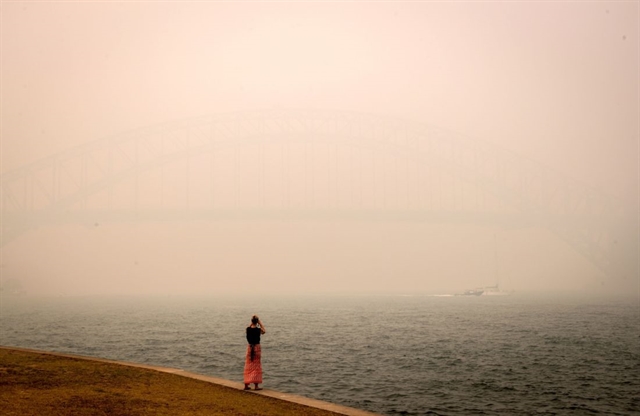 World
World


|
| The Sydney Harbour Bridge is enveloped in haze caused by nearby bushfires on Dec 10. — AFP/VNA Photo |
SYDNEY — Australia's biggest city is facing a "public health emergency" over the bushfire smoke that has choked Sydney for weeks, leading doctors warned Monday after hospitals reported a dramatic spike in casualty department visits.
Hundreds of climate change-fuelled bushfires have been raging across Australia for months, with a "mega-blaze" burning north of Sydney destroying several homes overnight and fires near Perth threatening towns.
More than 20 medical groups including the Royal Australasian College of Physicians – which represents 25,000 doctors and trainees – released a joint statement Monday calling on Australia's government to address the toxic air pollution.
"The air pollution in NSW is a public health emergency," the Climate and Health Alliance said.
"Smoke from bushfires has produced air pollution of up to 11 times the base 'hazardous' level in parts of Sydney and New South Wales.
"Bushfire smoke is particularly hazardous because of the high levels of tiny particles (PM2.5)."
The New South Wales state health department said it recorded a 48 per cent increase in the number of people visiting hospital emergency rooms with respiratory problems in the week ending December 11 compared to the five-year average.
Visits spiked 80 per cent on December 10, when air quality plummeted across Sydney prompting up to 20,000 residents of Australia's biggest city to march in protest the following day.
The Climate and Health Alliance called on the government to take urgent action to curb emissions, saying climate change is worsening bushfires that are having "devastating impacts on human health".
"The air pollution events resulting from bushfires will become more and more frequent and are a result of climate change," it said.
"Our governments must act quickly to rapidly and deeply reduce greenhouse gas emissions, which we know are driving climate change."
Prime Minister Scott Morrison last week made a rare admission that climate change is one of the "factors" behind the fires, but defended Australia's record on emissions reduction and failed to announce further measures to address the issue.
Six people have been killed, more than 700 houses destroyed and at least three million hectares of land burned this bushfire season. — AFP




